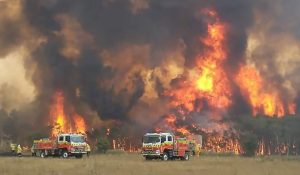Thunderstorms and showers brought some relief for firefighters battling deadly wildfires across Australia’s drought-parched east coast on Wednesday, but also raised concerns that lightning will spark more fires before dangerous hot and windy conditions return.
Around 2,300 firefighters in New South Wales state were making the most of relatively benign conditions by frantically consolidating containment lines around more than 110 blazes and patrolling for lightning strikes, state Rural Fire Service Commissioner Shane Fitzsimmons said.
“Unfortunately with lightning strikes, it’s not always the next day [the fires] pop up,” Fitzsimmons told the Australian Broadcasting Corp.
“They can smolder around in trees and in root systems for a couple of days and pop up under drier, hotter conditions, so we are very mindful of that as we head into Friday,” he added.
The containment work comes as the death toll since the fires flared in September rose by one to 26. Matt Kavanagh, a 43-year-old Victoria state firefighter, was killed in a vehicle crash on Friday, officials said. Kavanagh was on the road working to extinguish unattended campfires when the crash happened, said Chris Hardman, Forest Fire Management Victoria’s Chief Fire Officer. It took police a few days to investigate his death before they confirmed it was linked to his work on the wildfires, and therefore part of the disaster’s official death toll.
“He’s such a well-loved guy,” Hardman told reporters. “For those people who knew Matt, it’s going to take a long time. I can’t imagine what that family is going through and what Matt’s colleagues are going through. It’s just such a very sad day.”
The unprecedented fire crisis in southeast Australia that has destroyed 2,000 homes and shrouded major cities in smoke has focused many Australians on how the nation adapts to climate change. Prime Minister Scott Morrison has faced fierce criticism both domestically and internationally for downplaying the need for his government to address climate change, which experts say helps supercharge the blazes.
The center-left opposition Labor Party has made political capital from the crisis by promising more ambitious policies than the ruling conservative coalition to tackle climate change. Opposition climate spokesman Mark Butler wants the government to allow a debate on climate change in Parliament when it returns in February.
“Hopefully we could fashion a bipartisan position,” Butler told ABC. The two sides last held a bipartisan position on climate change in 2007, and have remained bitterly divided ever since on issues such as making carbon polluters pay for their emissions.
Labor had pledged to reduce Australia’s greenhouse gas emissions by 45 percent below 2005 levels by 2030 and achieve zero emissions by 2050 if it had won last year’s elections.
The coalition government has committed to reduce emissions by 26 percent to 28 percent by 2030 and warns that Labor’s more ambitious target would wreck the economy. The government argues that Australia is responsible for only 1.3 percent of global emissions and more ambitious targets would not ease the current fire crisis, which follows Australia’s hottest and driest year on record.
Several firefighters unions urged the federal government on Wednesday to order a royal commission — the nation’s highest form of investigation — into the wildfires. Environmental group Greenpeace Australia said any such investigation must analyze the role of climate change.
“This unprecedented and catastrophic fire season still has months to go and the next one will not be far behind. We need to start planning now so the chaotic scenes witnessed this summer do not become an annual occurrence,” Greenpeace Australia Pacific’s Head of Campaigns, Jamie Hanson, said in a statement. “But this inquiry needs to go beyond the symptoms of the bushfire crisis and look at the largest underlying cause of the conditions that have exacerbated these fires, which is burning coal. “
Australia is the world’s largest exporter of coal and liquefied natural gas, but Morrison rejected calls last month to downsize Australia’s lucrative coal industry.
The wildfire disaster, which is likely to continue throughout the Southern Hemisphere summer, has galvanized calls for more global action on climate change.
Elton John and actor Chris Hemsworth are among the celebrities donating big bucks to help aid the firefighting efforts. Hemsworth, an Australian who lives in the drought-affected New South Wales town of Byron Bay, wrote on Twitter that he was donating $1 million and asked his followers to show support. “Every penny counts,” he wrote.
John announced during his Farewell Yellow Brick Road concert in Sydney on Tuesday that he will also donate $1 million. The singer said he wanted to bring attention to the devastation that wildfires have caused, saying it has reached a “biblical scale.”
Hemsworth and John join a growing list of celebrities, including Pink, Nicole Kidman, and Keith Urban, who have pledged to donate toward relief efforts.
Prince Charles, who is next in line to become the British monarch and king of Australia, said in a video message from Scotland that he and his wife Camilla had been in despair watching the infernos burn across Australia.
“I fear this is a hopelessly inadequate way of trying to get a message to all of you that both my wife and myself are thinking of you so very much at such an incredibly difficult time and in such impossible and terrifying circumstances,” the prince said.
By Rod McGuirk for The Associated Press. Associated Press writer Kristen Gelineau in Sydney contributed to this report.

































